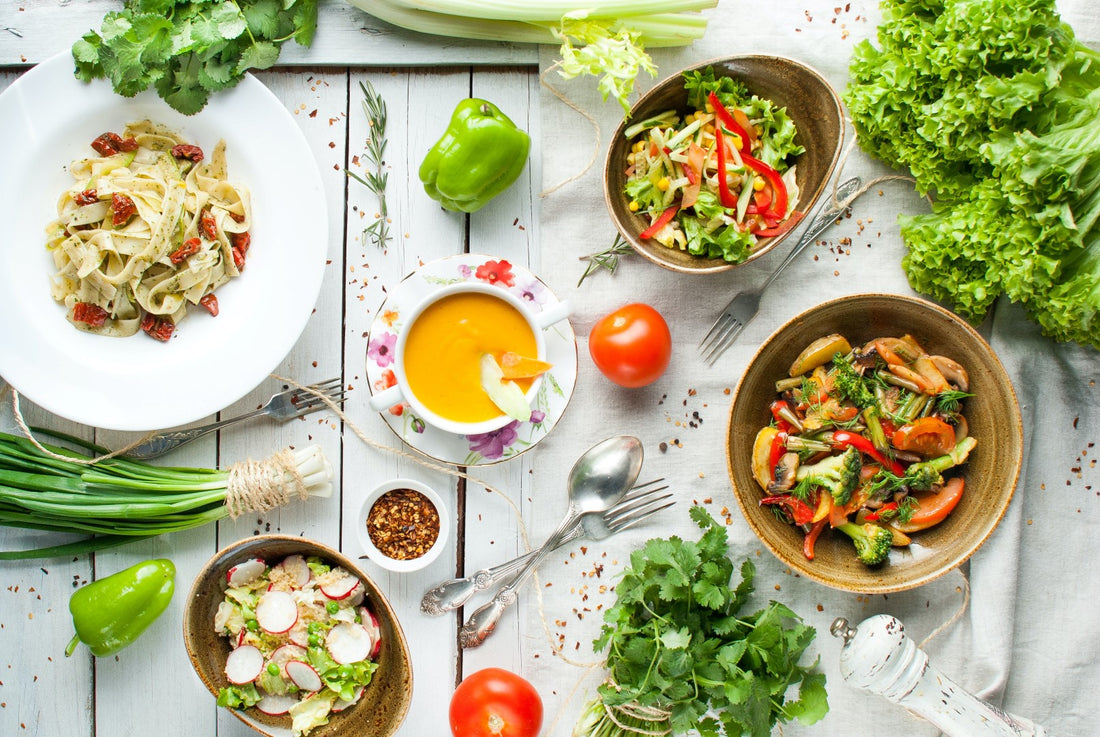Time for a bonus for lovers of healthy eating and plant foods. The vegan diet is becoming popular among more and more people, so today we will discuss this issue and provide you with even more new knowledge. Can balancing plant meals nutritionally be easy, quick and pleasant? You will find the answer in our article.
Vegan diet – what exactly is it and what does it involve?
Today we will make your plate much greener, because now is the moment for us to devote ourselves to the issue of a vegan diet. We believe that the richness of plant flavors will absorb you endlessly and you will also develop a great sympathy for this way of eating. But all in good time.
We have heard that some people are still not sure what exactly a plant-based diet, also known as a vegan diet, is. Of course, ignorance is absolutely no reason to be ashamed. We are in a hurry to explain this especially for you. This particular way of eating involves eating only foods of plant origin. So what does a vegan diet exclude? In short, we are talking about all types of meat and animal products.
Let's clarify one more issue so that nothing will pose any further doubts for you. We've probably all witnessed someone using the terms vegan and vegetarian interchangeably. It's time to deal with this once and for all - the second group mentioned does not eat only meat, so this type of diet may include products such as cheese, eggs and milk.
It is very possible that when you think about the issue we are discussing today, you are wondering who exactly decides on this way of eating. For some, veganism even seems quite restrictive - although we assure you that it does not have to be like that, but more on that in a moment.
So let's get back to the main idea. Vegan diet – who is it intended for? We have good news. There are no major restrictions as to who can follow this type of diet, because if it is properly balanced, it will work for almost everyone. Nevertheless, we would like to remind you that the diet you follow every day should always be adapted to your individual needs, capabilities and preferences.
Ok, so what are the most common reasons for switching to a plant-based diet? Below we present a short list of the main reasons.
- Ethical reasons - mainly related to the lack of consent to animal suffering.
- Ecological reasons - the main factor here is the awareness of the negative impact of meat production on the environment.
- Health reasons – some people decide to go vegan to take better care of their body.
- Reasons related to culinary preferences - some vegans simply do not like the taste or texture of meat and animal products.
As you can see, switching to a plant-based diet can have many reasons. Sometimes the decision to stop eating meat and dairy products is also a simultaneous mixture of several different factors.
These are probably the most important basics, so we can move on. Are you still wondering whether plant-based meals can really be eaten every day? Then this is the perfect time to take this issue under the microscope!
Vegan diet and health – the impact of plant-based cooking on the body
In the earlier part of the article, we mentioned something about the fact that veganism can be a healthy diet, but you need to take care of the correct balance of meals. Do you remember this mention? Or maybe you're not sure what exactly we had in mind back then?
Vegan diet and nutritional deficiencies
For novices who jump straight into the deep end of plant-based nutrition, but do not have much dietary awareness, it may be a difficult journey. Of course, regardless of what you eat every day, it would be good to ensure the presence of valuable ingredients in the dishes you prepare. Balancing vegan meals, however, may be a bit more challenging due to the large number of foods excluded from the diet. So it would be good to know some super products that will help you better protect yourself against deficiencies. We have prepared a short cheat sheet below.
- Vegetable protein can be found mainly in legumes. Tofu, red beans and peas are examples of products that should certainly become part of your vegan menu. Remember that protein is also found in nuts and seeds.
That's not all, let us share with you information about another valuable source of protein that we came across during our research related to the work on the prepared product. And we mean, of course, alfalfa sprouts, which are also a source of all 9 exogenous amino acids necessary for the body. And who says that a plant-based diet is not healthy?
- Calcium is found in, among others, in green vegetables such as kale, cabbage or broccoli. You can also absorb this nutrient by eating dried figs and apricots.
- Iron in your daily diet protects, among others: against the risk of developing anemia. You will find them in nuts, seeds and whole grain products.
We also recommend remembering that in order to better absorb iron, it would be good if your diet also included parsley, red pepper and black currants. These products are a source of vitamin C, which improves the absorption of this valuable mineral substance.
Due to the presence of so many valuable nutrients in plant products, such as protein, a vegan diet for athletes and other physically active people will also be a good solution.
And now it's time for applause! Together, we have just debunked several myths about cuisine based on vegetable and fruit ingredients. A plant-based diet does not have to be deficient if we just pay attention to its proper balance , but you will certainly be able to cope with it perfectly well.
Moreover, introducing diversity into our diet gives us great opportunities
- pescatarianism - excludes the consumption of meat, but allows the consumption of fish and seafood
- flexitarianism - allows you to eat meat in reduced quantities
- Pollo-vegetarianism – excludes red meat
- ovegetarianism - excludes all meat from the diet, but allows the consumption of other animal products, such as eggs and dairy products
- lacto-vegetarianism - Excludes all meat and egg products from the diet
Variety of plant foods
If you are on a vegan diet or have ever asked for a plant-based meal somewhere outside your home, it is possible that when you sat down at the table, you saw considerable disappointment on your face. Unfortunately, for some people, a plant-based dish simply means a portion of potatoes with salad without meat on a plate... Oh, horror, let's erase this sad image from memory. Fortunately, when cooking for yourself, you can focus on variety as much as possible - it is even particularly advisable.
So, the next time you start planning healthy meatless meals, make sure to include plenty of nutrient-rich products on your plate . Throw away the monotony and go a little crazy. Dishes based on various ingredients will have a better effect on your body. Remember to include healthy vegetable fats, as well as vitamins and other substances valuable for health in your meals. It's better not to limit yourself when it comes to cooking, right?
You are undoubtedly already well aware that vitamins and minerals are essential in a vegan diet, and you have quite good theoretical preparation for balancing plant-based meals on your own. So what is the time now? Let us keep you in this ignorance for a moment.
Supplementation in a vegan diet
As we have already explained, nutrients in a vegan diet are abundant and can be obtained in handfuls. But what should you watch out for? Or are there any pitfalls to a plant-based diet?
At this point, we would like to devote a moment to the issue of supplementation in plant nutrition. Are we sure we can absorb all the valuable ingredients from this type of food? If you decide to start a plant-based diet, it will undoubtedly be a good idea to regularly check the level of vitamin B12 in your body . Remember that you can also supplement this particular nutrient to prevent the risk of deficiency - this action is often recommended to vegans and sometimes also to vegetarians. Additionally, calcium and vitamin D intake may be lower in vegans. While vegans may be less exposed to pro-inflammatory fatty acids, intakes of the essential omega 3 fatty acids EPA and DHA are lower in a vegan diet, also necessitating supplementation.
Veganism and health – the benefits of a plant-based diet
Scientific research on the vegan diet indicates a number of benefits for the body that this particular style of eating can bring. However, it is important to remember that without professional supervision, a traditional plant-based diet (vegan, vegetarian) may increase the risk of nutritional deficiencies in infants, children/adolescents, women, pregnant/breastfeeding women and the elderly. However, in the case of a well-balanced diet, what specific advantages do we think about? Below, especially for you, we have prepared a short summary of the most important advantages of a plant-based diet:
- lower blood pressure,
- reduced risk of type B diabetes,
- lower cholesterol,
- obesity prevention,
- less susceptibility to chronic diseases.
Sounds very good, right? I think we managed to prove to you today that healthy plant food is a treasure trove of highly nutritious substances for the body. However, we have one more - probably our favorite - advantage of a plant-based diet. And it is, of course, the opportunity to open yourself to new tastes. So many interesting dishes based on vegetables and fruits are still waiting for you to discover, and it's really exciting how many journeys through the healthy kitchen you can still embark on. One of them is just ending, but don't worry - we will meet again soon.
Bibliography:
- https://www.ncbi.nlm.nih.gov/pmc/articles/PMC10675717/
- https://www.cambridge.org/core/journals/proceedings-of-the-nutrition-society/article/abs/nutritional-and-health-benefits-and-risks-of-plantbased-substitute-foods/87FD2B04718DA493FB601F8B02AF58C4
- https://www.tandfonline.com/doi/full/10.1080/10408398.2023.2263574
- https://www.ncbi.nlm.nih.gov/pmc/articles/PMC10447911/
- https://pubmed.ncbi.nlm.nih.gov/33535684/
- https://pubmed.ncbi.nlm.nih.gov/31705483/
- https://pubmed.ncbi.nlm.nih.gov/28111625/
- https://ncez.pzh.gov.pl/abc-zywienia/fakty-i-mity-dotyczace-diety-weganskiej/


